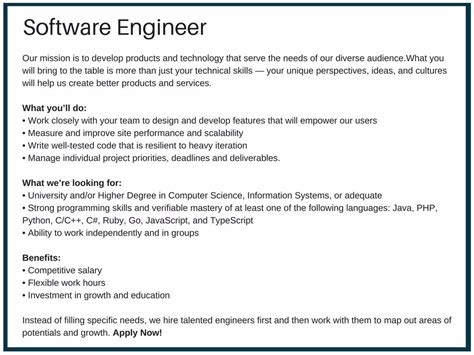In today's fast-paced technology landscape, software application engineers play a vital role in designing, developing, and maintaining software applications that cater to various industries and needs. With the rapid growth of technology, the demand for skilled software application engineers has increased significantly, making it an attractive career option for many. However, to succeed in this role, it is essential to understand the responsibilities and requirements of a software application engineer.
Software application engineers are responsible for creating software applications that meet specific requirements and needs. They work on various stages of software development, from designing and coding to testing and deployment. Their primary goal is to ensure that the software application is efficient, scalable, and meets the user's requirements.
Key Responsibilities of a Software Application Engineer
As a software application engineer, some of the key responsibilities include:
- Designing and developing software applications that meet specific requirements and needs
- Writing clean, efficient, and well-documented code
- Collaborating with cross-functional teams, including designers, product managers, and quality assurance engineers
- Troubleshooting and debugging software applications to identify and resolve issues
- Conducting unit testing and integration testing to ensure the software application works as expected
- Deploying software applications to production environments
- Ensuring that software applications are scalable, secure, and meet the required performance standards

Technical Skills Required for a Software Application Engineer
To be successful as a software application engineer, one needs to possess a combination of technical skills, including:
- Proficiency in programming languages, such as Java, Python, C++, or JavaScript
- Experience with software development methodologies, such as Agile or Scrum
- Knowledge of database management systems, such as MySQL or MongoDB
- Familiarity with cloud computing platforms, such as Amazon Web Services or Microsoft Azure
- Understanding of software testing frameworks and tools, such as JUnit or PyUnit
- Experience with version control systems, such as Git or SVN
Soft Skills Required for a Software Application Engineer
In addition to technical skills, software application engineers also need to possess soft skills, including:
- Excellent communication and collaboration skills
- Strong problem-solving and analytical skills
- Ability to work in a fast-paced environment and meet deadlines
- Strong attention to detail and quality
- Ability to adapt to new technologies and processes
- Strong customer service skills and ability to work with stakeholders

Education and Certification Requirements for a Software Application Engineer
To become a software application engineer, one typically needs to possess a bachelor's degree in computer science, software engineering, or a related field. Some employers may also require a master's degree or a certification in a specific programming language or technology.
- Bachelor's degree in computer science, software engineering, or a related field
- Master's degree in computer science, software engineering, or a related field (optional)
- Certification in a specific programming language or technology (optional)
Salary Range for a Software Application Engineer
The salary range for a software application engineer varies based on factors, such as location, experience, and industry. However, according to national averages, software application engineers can expect to earn a salary ranging from $100,000 to over $200,000 per year.
- Average salary range: $100,000 - $200,000 per year
- Entry-level salary range: $70,000 - $100,000 per year
- Senior-level salary range: $150,000 - $250,000 per year

Growth Opportunities for a Software Application Engineer
The demand for software application engineers is expected to grow significantly in the coming years, driven by the increasing need for software applications in various industries. According to the Bureau of Labor Statistics, the employment of software developers is projected to grow 21% from 2020 to 2030, much faster than the average for all occupations.
- High demand for software application engineers across various industries
- Opportunities for career advancement and professional growth
- Potential for freelancing or starting a software development business

Conclusion
In conclusion, software application engineers play a vital role in designing, developing, and maintaining software applications that cater to various industries and needs. To succeed in this role, one needs to possess a combination of technical skills, soft skills, and education. With the increasing demand for software applications, the career prospects for software application engineers are expected to be bright, with opportunities for career advancement and professional growth.
We hope this article has provided you with valuable insights into the world of software application engineering. If you have any questions or comments, please feel free to share them below.





What is the average salary range for a software application engineer?
+The average salary range for a software application engineer varies based on factors, such as location, experience, and industry. However, according to national averages, software application engineers can expect to earn a salary ranging from $100,000 to over $200,000 per year.
What are the key responsibilities of a software application engineer?
+Software application engineers are responsible for designing, developing, and maintaining software applications that meet specific requirements and needs. They work on various stages of software development, from designing and coding to testing and deployment.
What technical skills are required for a software application engineer?
+To be successful as a software application engineer, one needs to possess a combination of technical skills, including proficiency in programming languages, experience with software development methodologies, knowledge of database management systems, and familiarity with cloud computing platforms.
